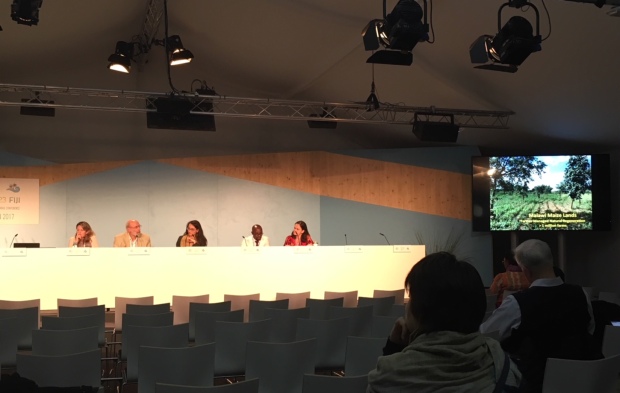There have been so many interesting events, panels and stands everywhere this week it has been hard to pick which one to go to!
Yesterday, the event “Our Common Home: Land, Oceans and Water-Food-Ecosystem Resilience in the Mid-Latitude Region” was the one that caught my attention. One of the speakers was Professor Dennis Garity, an agroforestry expert working on the UN grassland program to combat desertification in Africa. He mentioned that Africa have committed to revegetating 100 million hectares of land, and have almost reached this goal. How do you make such an achievement? In the 1980s, people were struggling to make a living on land with poor soil quality, and were forced to cut down all the trees to sell wood. Now, many families have restored trees in their lands by planting acacias that are effective at absorbing CO2, and which provide biofertilizer. The trees also can also be sold one at a time when landowners are in need of extra income.
Professor Garity also mentioned that Brazil has more farmers planting trees compared to any other country in the world, while at the same time the Amazon is being deforested at a rapid rate. Although one does not compensate for the other, these planting efforts could lead to a reduction in emissions from agriculture, eventually even offsetting greenhouse gases of agriculture and making agriculture emissions-neutral.

Another presenter spoke of her conservation experience with Peruvian indigenous people, and the importance of their voices being heard and their rights guaranteed. She stressed that there has to be recognition of innovation and that they must feel the positive repercussions of financing. Traditional knowledge is not static, but adapts to different times and even climate change. We must also recognize and protect the possibility of change, and use our knowledge for adaptation and conservation. Climate investment has to reach these communities and invest in their projects. This investment must be inclusive and recognize the efforts of those on the ground. This sentiment mirrored another event I went to today, where Brazilian indigenous people presented their projects and emphasised the importance of using traditional knowledge and of allowing them to do the projects for themselves; they want to reclaim their strength and culture rather than have an NGO to come sweeping in to “save” them and claim the glories.
Finally, Julianne Hickey, a representative of Caritas Oceania, spoke of her people’s relationship with the ocean. Historically, Pacific people have had abundant food and water, but that has been changing over the last 20 years. To highlight their issues and secure climate finance they created a network of stories – ‘talatalanoa’ – a social network where people from different islands shared their stories. Through this network, we begin to better understand the impacts of climate change on health and food security, and people’s needs and responses. People respond differently to climate change impacts; some have become climate immigrants, some adapt, while others fight to save their lives and cultures.
For Islanders, action on climate change is particularly urgent. To them, the Paris Agreement’s ‘loss & damage’ mechanism is inadequate; it is limited to minor financial compensation for adaptation, and there has been no recognition that entire cultures have and will be lost. Island people, whose contribution to climate change has been negligible, are severely impacted by the carbon footprint of people around the world. Their future and well-being is threatened, not just by climate change, but by many other exploitive actions. We need a global ‘talatalanoa’ to share experience and create a collaboration of civil society and governments towards effective actions on mitigation, adaptation and loss and damage.
This panel was very interesting to me because of the variety of topics discussed. Efforts to empower locals, tackle climate change, improve food security and deliver environmental justice in a holistic manner that were highlighted. Local agroforestry, the importance of traditional knowledge and nanofinancing, as well as an innovative social networks were also discussed. All are extremely creative approaches and, while they may seem local, these strategies in quantity can change the whole world.
 Anna Maria Cárcamo is from Rio de Janeiro, which is the city with the largest urban forest in the world. It is also her favourite city. She studies Environmental Management at Yale School of Forestry and Environmental Studies and previously graduated in Law and worked with environmental law in Brazil. Her main interests are global environmental governance, communications, and environmental justice. She also loves food, movies and laughing. She is very excited to be representing IFSA at COP23!
Anna Maria Cárcamo is from Rio de Janeiro, which is the city with the largest urban forest in the world. It is also her favourite city. She studies Environmental Management at Yale School of Forestry and Environmental Studies and previously graduated in Law and worked with environmental law in Brazil. Her main interests are global environmental governance, communications, and environmental justice. She also loves food, movies and laughing. She is very excited to be representing IFSA at COP23!